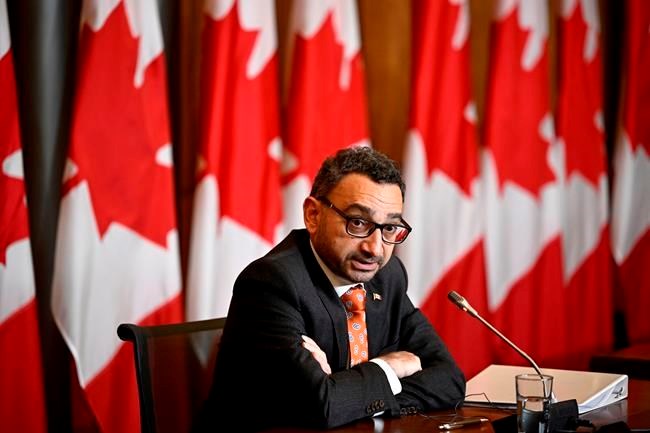MONTREAL — Airlines and some advocates expressed disappointment in passenger rights reforms laid out by Transport Minister Omar Alghabra on Monday, with carriers saying the overhaul goes too far and consumer rights groups demanding further action.
The mixed response came after the Liberals tabled legislation Thursday targetting traveller compensation in a move to tighten loopholes and toughen up on penalties.
If the bill passes, the changes will put the onus on airlines to show a flight disruption is caused by safety concerns or reasons outside their control, with specific examples to be drawn up by the 91È¡┤┤ Transportation Agency as a list of exceptions around compensation.
"This means there will be no more loopholes where airlines can claim a disruption is caused by something outside of their control for a security reason when it's not," Alghabra told reporters in Ottawa.
"And it will no longer be the passenger who will have to prove that he or she is entitled to compensation. It will now be the airline that will need to prove that it does not have to pay for it."
"I really think airlines left government no choice, after what we saw, to further clarify the rules and make sure that passenger rights are protected," he said.
Currently, a passenger is entitled to between $125 and $1,000 in compensation for a three-hour-plus delay or a cancellation made within 14 days of the scheduled departure — unless the disruption stems from events outside the airline's control, such as weather, or a safety issue such as mechanical problems. The amount varies depending on the size of the carrier and length of the delay.
The National Airlines Council of Canada, an industry group representing four of the country's biggest carriers, denounced the potential scrapping of safety concerns as an exception to compensation requirements.
"No airline should be penalized for adhering to the highest standards of safety, whether that is due to weather, mechanical issues or other safety-related constraints," said council president Jeff Morrison in a statement.
He also called for airport upgrades and greater accountability across the range of aviation players.
"Airlines are being forced to continue shouldering sole responsibility for all organizations in the overall system, over which they have no control," Morrison said.
Tabled in the House of Commons as part of a budget implementation bill Thursday, the amendments ratchet up the maximum penalty for airline violations to $250,000 — a tenfold increase — and put the regulatory cost of complaints on carriers. In theory, the measure gives airlines an incentive to brush up their service and thus reduce the number of grievances against them.
Alghabra had defended placing the financial weight squarely on carriers. "The customer paid the airlines to receive a service. Therefore the airlines are responsible for delivering that service," the minister said, adding that the federal budget mandates data sharing and thus broader accountability in the aviation sector.
The legislation also demands that airlines institute a process to deal with claims and respond to complaints with a decision within 30 days. The establishment of "complaint resolution officers" at the 91È¡┤┤ Transportation Agency should also expedite the process for complaints, as should a 60-day maximum for the regulator to handle them, some advocates say.
The complaints backlog at the agency now stands at about 45,000, more than triple the tally from a year ago and requiring at least 18 months on average per case.
Some advocates cast doubt on whether the so-called safety loophole for compensation was really shut tight.
"The way it was sold today was, 'We got rid of the three categories,'" — within the airline's control, outside its control and safety concerns, with the latter two reasons for a delayed or cancelled flight exempting an airline from compensating passengers — said Public Interest Advocacy Centre executive director John Lawford.
Instead of the flight disruption categories, the 91È¡┤┤ Transportation Agency would draft a list of exceptions for compensation, including bad weather, the minister said.
"I'm sure the airlines will say, "'Well, one of them should be safety," Morrison predicted.
Gabor Lukacs, president of the Air Passenger Rights advocacy group, questioned confidentiality rules for the complaints process.
While rulings by the newly established complaint resolution officers would mandate the publication of some information, such as a flight number and date and whether compensation was issued — to alert fellow passengers to their own potential payout — "what is not becoming public is the evidence and the reasons and the analysis," he said.
“What happens with mediation is still a black box," Lukacs said. “My impression remains that this is essentially a smokescreen, and that it is going to be a secretive process that will cover up the real problems that passengers are facing."
NDP transport critic Taylor Bachrach said the proposed law still leaves the so-called safety loophole intact and falls short of European passenger rights standards.
"When we look at the European model, it's been working for over a decade. And I can't explain why the minister hasn't chosen to emulate that model. He's trying to reinvent the wheel and it's not necessary."
Alghabra rejected this depiction pre-emptively. "We are actually consistent with the EU. In fact, we have stronger measures being proposed in this bill than the EU standards," he said. The minister pointed to provisions that require airlines to compensate passengers for "delayed" luggage, not just lost or damaged bags.
"I know there may be some, mostly airlines, who claim that we are unfairly targetting them with these new measures to hold them accountable," he said, but insisted the move was "not meant to demonize" carriers or their employees.
This report by The 91È¡┤┤ Press was first published April 24, 2023.
Christopher Reynolds, The 91È¡┤┤ Press




